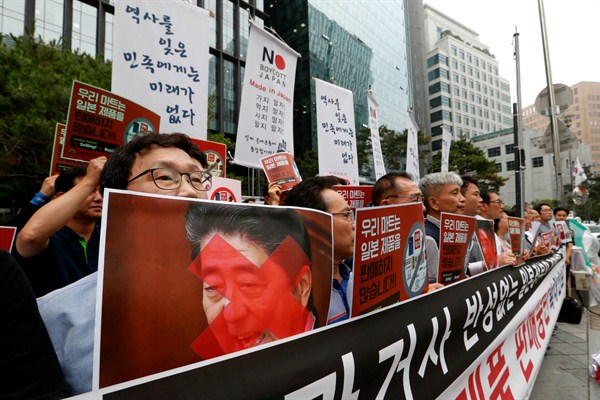As China’s trade war with the United States casts a pall over the global economy, a separate dispute between two of China’s neighbors—and two American allies—is adding to the gloomy outlook. Earlier this month, Japan curbed exports to South Korea of three materials that are necessary for the production of semiconductors and display screens, threatening to upend South Korea’s technology industry and throw a wrench into complex global supply chains for smartphones, televisions and other popular consumer devices. The move is only the latest escalation in an ongoing standoff, rooted in deep historical grievances, that has regional observers and officials in Washington increasingly worried.
Under the new restrictions, which took effect on July 4, Japanese exporters must apply for a license from the government each time they want to make a shipment of the affected materials: hydrogen fluoride, photoresists and fluorinated polyimides. The license can take up to 90 days and had previously been waived for South Korea. Japanese officials claim the change was made on national security grounds, alleging that the materials, which have potential military applications, have been improperly managed by South Korean companies in the past. Prime Minister Shinzo Abe has even hinted that the materials may have been illegally transferred to North Korea, which South Korea denies. Hydrogen fluoride, also known as etching gas, is a particular concern because it can be used to manufacture chemical weapons like sarin and VX, which North Korea is widely believed to have stockpiles of.
Tokyo has not released any evidence to back up its claims, maintaining instead that a breakdown in communication channels with Seoul in recent years has made it difficult to confirm that exports of sensitive substances are being properly handled. But that is little more than a smokescreen to hide other, older grievances over long-simmering tensions tied to Japan’s colonial rule of the Korean Peninsula prior to 1945. Since last fall, a number of decisions by South Korea’s Supreme Court have found Japanese companies liable for damages to South Koreans who were forced to work without pay during World War II.

